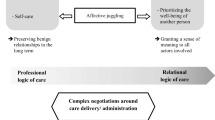Conclusion
The notion of caring is extremely problematic in the way that it is defined, practised and promoted. In response to Gorovitz I have attempted to go beyond the discussion of how health care workers can promote care at an organisational level, and look at some of the paradoxical elements of caring as it is currently being described. These paradoxes arise, in part, from the current emphasis on individualism in Western society which has made the notion of ‘mass care’ unacceptable because it fails to acknowledge individual differences in patients. If we acknowledge patients as individuals, however, we must also acknowledge practitioners as unique persons too, and we therefore need to be very careful about subjecting them to the same type of generalised prescriptions to which we have subjected patients in the past.
A form of care which is not detached and impersonal is being advocated it seems, but it is unlikely that anyone would want health care workers to become inextricably emotionally entwined with their patients. Plotting out the middle ground, however, is difficult to do without recourse to generalised principles. These principles are extremely valuable in the way that they can shape policy and the planning of services, but they are difficult to apply to the relationships between individual staff and patients simply because they are generalised rather than specific. In using these principles, therefore, we can only determine the general context in which caring takes place, and not the nature of this caring.
These problems and paradoxes seem, at the moment, to be inherent in caring as it has been recently portrayed. It may be possible to resolve them, or find ways out of these dilemmas, but this can only be done by a very careful examination of motivations and values. In the meantime we may have to be less ambitious in our aspirations, and think about how to define acceptable, rather than ideal standards of care.
Similar content being viewed by others
References
Gorovitz, S. (1994). Is caring a viable component of health care?Health Care Analysis 2(2) 129–133.
Smith, P. (1992).The Emotional Labour of Nursing, Macmillan Education, Basingstoke.
Menzies, I. E. P. (1960). A case study of the functioning of social systems as a defence against anxiety. A report on the study of a nursing service of a general hospital.Human Relations 13, 95–121.
Hochschild, A. R. (1983).The Managed Heart: Commercialisation of Human Feeling, University of California Press, Berkeley.
Benner, P. and Wrubel, R. (1989).The Primacy of Caring: Stress and Coping in Health and Illness, Addison-Wesley, Menlo Park.
Clarke, M. (1978). Getting through the work. In,Readings in the Sociology of Nursing, ed. by R. Dingwall and J. McIntosh, Churchill Livingstone, Edinburgh.
Dunlop, M. J. (1986). Is a science of caring possible?Journal of Advanced Nursing 11, 661–670.
Author information
Authors and Affiliations
Rights and permissions
About this article
Cite this article
Reed, J. Two paradoxes of caring: A response to gorovitz. Health Care Anal 2, 217–220 (1994). https://doi.org/10.1007/BF02251022
Issue Date:
DOI: https://doi.org/10.1007/BF02251022




